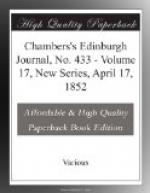We do not need to inform the reader, that conventual establishments are not now so thin-sown in England as they were a few years ago, or that they occasionally draw into their circle individuals who started in life with very different prospects before them. The whole subject is one worthy of some inquiry, as a feature of our social state, by no means devoid of political importance; and it is for this very reason that we draw attention to the subject. Instead of contemptuously ignoring such things, let them, we say, be made known and investigated in a calm and philosophical spirit. It is for want of a steady comprehension of facts of the kind here adverted to, that an illusion is kept up respecting our existing social condition. It is heedlessly said, and every one repeats the error, that the age is a hard, mechanical one, which shines only in splendid materialities; but is it compatible with this notion, that there is ten times more earnest religious feeling of one kind and another than there was thirty years ago; that antiquities, mediaeval literature and architecture, are studied with a zeal hitherto unknown; and that such mystical writers as Carlyle, Tennyson, and Browning, carry off the palm from all the calm-blooded old-school men of letters? We rather think it is the most romantic, supra-material age that has yet been seen. The resurrection of conventual life, in some instances Catholic, in others Protestant, appears to us as one of the facts of this unexpected reaction, which doubtless will run its course, and then give place to something else, though not, we trust, till out of its commixture of good and evil some novelty hopeful for humanity has sprung.
THE LATE EMPEROR OF CHINA.
The announcement of a work by the late Dr Gutzlaff, entitled the Life of Taou-Kwang, late Emperor of China, with Memoirs of the Court of Peking,[1] excited a good deal of expectation; but for our own part, now that the book is published, we must confess our disappointment on finding it not a well-constructed memoir, but a volume bearing the appearance of a collection of materials put together just as they came to hand, with a view to re-arrangement. Declining health probably prevented the author from perfecting his plan, and hurried his pages to the press; death has now removed him from his labours. But a collection of authentic historic facts is valuable, however loosely embodied; and few writers have enjoyed such favourable opportunities as Dr Gutzlaff for obtaining them.
Referring first to the personal history of Taou-Kwang, we find that his education was more Tatar than Chinese. He was one of the numerous grandchildren of the imperial house of Keelung, but without any expectation of filling the throne, as both his mother and paternal grandmother were inferior members of the imperial harem. The discipline under which the royal family was trained, was of the strictest kind. Each of the male children,




